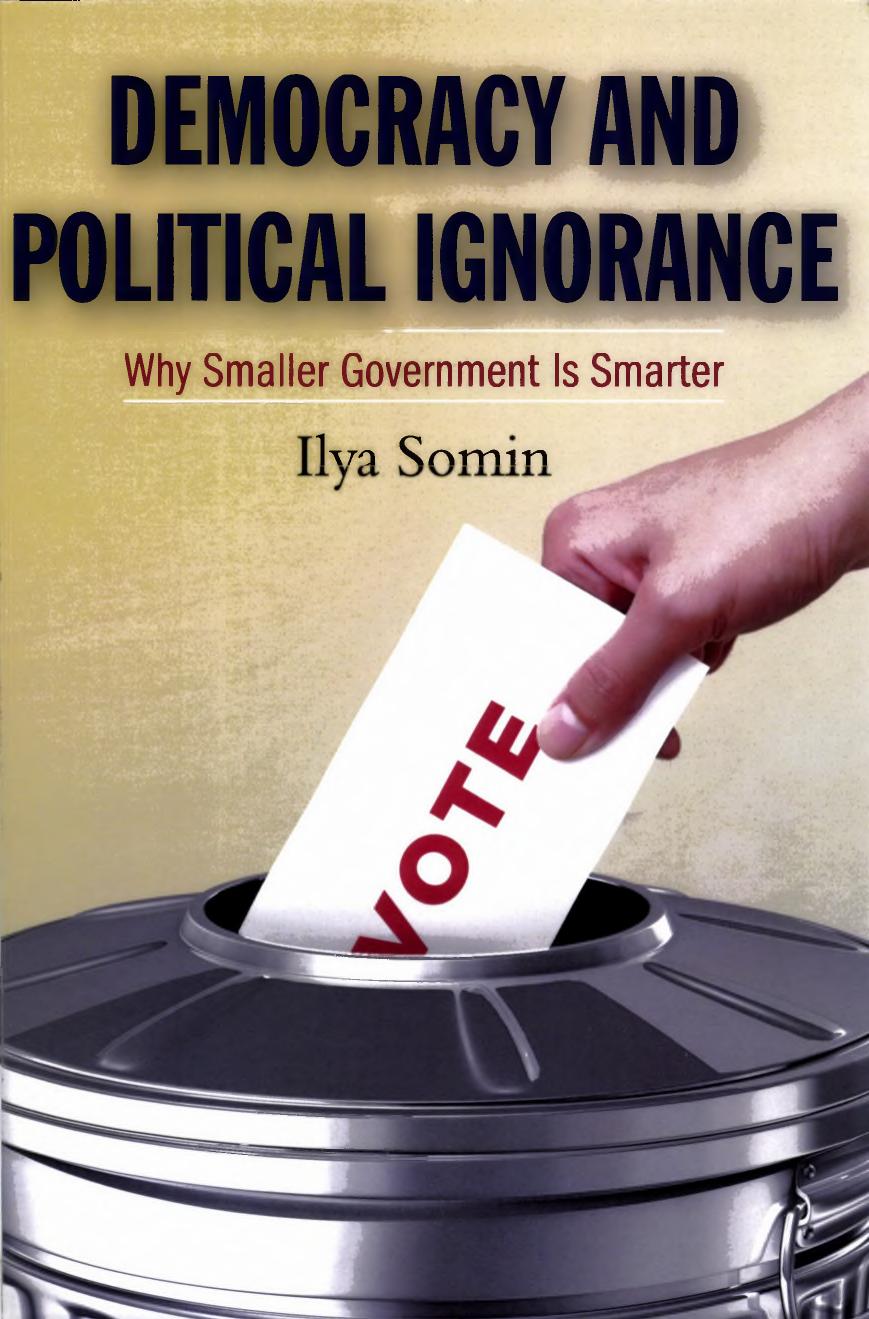Democracy and Political Ignorance: Why Smaller Government Is Smarter by Ilya Somin

Author:Ilya Somin [Somin, Ilya]
Language: eng
Format: epub, pdf
Published: 0101-01-01T00:00:00+00:00
CHAPTER 6
Political Ignorance and Judicial Review
[J]udicial review is a deviant institution in the American democracy.
Alexander Bickel1
LIMITING AND DECENTRALIZING GOVERNMENT POWER can mitigate the problem of political ignorance. The institution of judicial review can also help with that task. By constraining the power of the elected branches of government, judicial review can reduce the complexity of the task facing voters and also help empower citizens to “vote with their feet.” Recognition of these potential advantages of judicial review also weakens the force of one of the main traditional objections to judicial invalidation of legislation: the so-called “countermajoritarian difficulty.”
The countermajoritarian difficulty has often been considered the most fundamental issue in debates over American constitutional law.2 It is “the central obsession of modern constitutional scholarship.”3 As legal scholar Alexander Bickel famously put it in his classic work The Least Dangerous Branch, “the root difficulty is that judicial review is a counter-majoritarian force in our system.”4 For Bickel and innumerable later writers, judicial review was an anomaly because it enabled an unelected judiciary to override the majoritarian will of the people represented by elected legislatures.5 A vast academic literature is devoted to analyzing the countermajoritarian difficulty.6
At various times, both conservative and liberal legal scholars have advocated the abolition or severe restriction of judicial review to prevent an unelected institution from overriding the will of a democratic majority.7 According to Robert Bork, perhaps the most prominent conservative critic of judicial review, the judicial invalidation of legislation is objectionable because it creates “new disabilities for democratic government.”8 Neal Katyal, a leading liberal constitutional law scholar, echoes Bork’s concern, expressing his own fear that “[f]or those worried about the vigor of popular rule in America, there is much to fear from judicial interpretation [of the Constitution].”9
The idea of the countermajoritarian difficulty rests on the premise that laws enacted by legislatures reflect the will of electoral majorities, which in turn relies on the assumption that the latter possess sufficient political knowledge to control what their representatives do. Yet most of the voluminous literature on this subject ignores the relevance of political ignorance.
An understanding of the depth and pervasiveness of voter ignorance should lead us to reconsider the countermajoritarian difficulty in several fundamental ways. If most of the electorate has little or no information on politics and government policy, it is likely that legislative output does not represent the will of the majority in the way that many constitutional theorists assume. Judicial invalidation of such legislation is not nearly as “countermajoritarian” as generally supposed. This key point is only the first of several important implications for voter ignorance on the central question of constitutional theory. Others include ways in which judicial review can alleviate the dangers of political ignorance and strengthen meaningful democratic control over government policy.
This chapter does not provide a comprehensive solution to the countermajoritarian difficulty or address the full range of issues relevant to the subject. The analysis here focuses on the claim that judicial review is “countermajoritarian” because it undercuts popular democratic control of public policy.
Download
Democracy and Political Ignorance: Why Smaller Government Is Smarter by Ilya Somin.pdf
This site does not store any files on its server. We only index and link to content provided by other sites. Please contact the content providers to delete copyright contents if any and email us, we'll remove relevant links or contents immediately.
The Secret History by Donna Tartt(16623)
The Social Justice Warrior Handbook by Lisa De Pasquale(11489)
Thirteen Reasons Why by Jay Asher(7788)
This Is How You Lose Her by Junot Diaz(5771)
Weapons of Math Destruction by Cathy O'Neil(5036)
Zero to One by Peter Thiel(4824)
The Myth of the Strong Leader by Archie Brown(4789)
Promise Me, Dad by Joe Biden(4447)
Beartown by Fredrik Backman(4417)
Stone's Rules by Roger Stone(4415)
How Democracies Die by Steven Levitsky & Daniel Ziblatt(4398)
The Fire Next Time by James Baldwin(4342)
100 Deadly Skills by Clint Emerson(4077)
A Higher Loyalty: Truth, Lies, and Leadership by James Comey(4032)
Rise and Kill First by Ronen Bergman(4012)
The David Icke Guide to the Global Conspiracy (and how to end it) by David Icke(3881)
The Farm by Tom Rob Smith(3872)
Secrecy World by Jake Bernstein(3782)
The Doomsday Machine by Daniel Ellsberg(3731)
